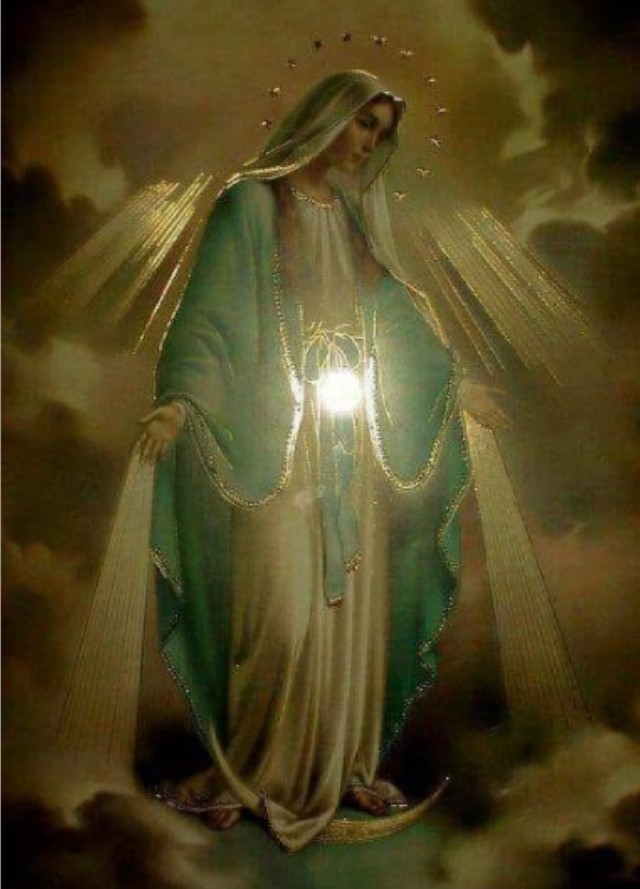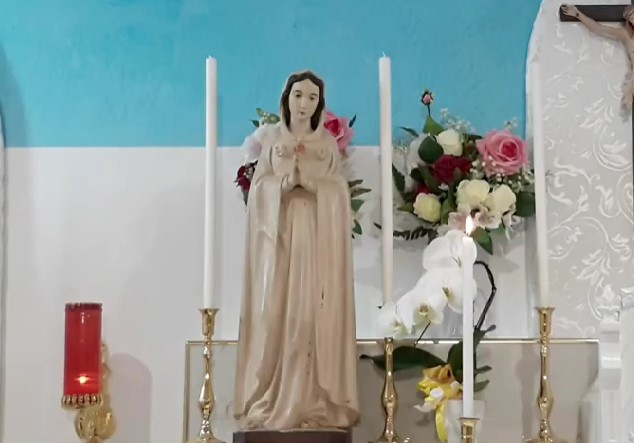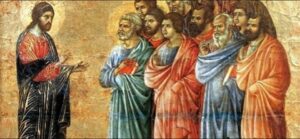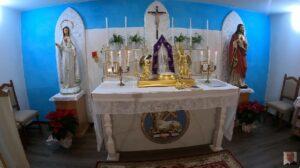

DALL’OMELIA DI DON ENRICO RONCAGLIA (**,1)
Sap 10:10-14
La Sapienza guidò per diritte vie il giusto, gli mostrò il regno di Dio, gli diede la conoscenza delle cose sante, ne prosperò le fatiche e ne coronò i lavori con frutti abbondanti. Lo assisté tra le frodi di chi lo raggirava e lo fece ricco. Lo guardò dai nemici, lo protesse dalle insidie, gli porse vittoria in aspra lotta, perché esperimentasse, che di tutto trionfa la pietà. Essa non abbandonò il giusto venduto, ma lo salvò dai peccatori e con lui discese nel carcere, ed anche tra le catene non lo lasciò, finché non gli ebbe portato lo scettro del regno e il potere contro coloro che l’opprimevano: dimostrò bugiardi i suoi accusatori e gli procurò eterna gloria, il Signore Dio nostro.
Luc 19:12-26
In quel tempo, disse Gesù ai suoi discepoli questa parabola: «Un nobil uomo partì per un lontano paese a ricevere l’investitura d’un regno, e ritornare. Perciò chiamati a sé i suoi dieci servi, diede loro dieci mine e disse loro: “Negoziatele sino al mio ritorno”. Ma i suoi cittadini gli volevano male: e gli spedirono dietro un’ambasciata, dicendo: “Non vogliamo che costui regni su di noi”. E avvenne che, tornato dopo preso il regno, fece chiamare a sé i suoi servi ai quali aveva dato il danaro, per sapere che traffico ne avessero fatto. E il primo venne a dire: “Signore, la tua mina ne ha fruttate dieci”. Ed egli disse: “Bravo, servo fedele, perché sei stato fedele nel poco abbi potere su dieci città”. Poi venne il secondo e disse: “Signore, la tua mina ne ha fruttate cinque”. E rispose. anche a questo; “Anche tu comanda a cinque città”. Poi venne un altro a dirgli: “Signore, eccoti la tua mina che ho tenuta involta in una pezzuola, perché ho avuto paura di te che sei uomo duro: prendi quello che non hai messo e mieti quello che non hai seminato”. Ed il padrone a lui: “Dalla tua bocca ti giudico, servo iniquo! Sapevi che sono uomo severo, che prendo quel che non ho messo, e mieto quello che non ho seminato; e perché allora non hai messo il mio danaro alla banca: ed io, al ritorno, l’avrei riscosso coi frutti?”. E disse agli astanti: “Toglietegli la mina e datela a colui che ne ha dieci”. Ma gli fecero osservare: “Signore, ne ha dieci”. E io vi dico: “A chi ha, sarà dato, e a chi non ha, sarà tolto anche quello che ha”».
Nella prima lettura si afferma che Dio assiste il giusto anche quando si trova in catene e in carcere. Verra’ liberato grazie all’intervento di Dio e sara’ riconosciuta la sua autorita’.
Il Vangelo parla della parabola delle dieci mine (misura del denaro) che il padrone consegna ai suoi servi affinche’, in sua assenza, le facciano fruttare. Ma chi non le fara’ fruttare e’ considerato servo infedele.
Vale dunque che “A chi ha, sarà dato, e a chi non ha, sarà tolto anche quello che ha”».
San Luigi IX e’ un esempio di servo fedele e umile. Passava molto tempo nelle preghiere e nelle funzioni religiose. Per questo venne criticato. Partecipo’ alle crociate (sia la prima che la seconda).
Sia lodato Gesu’ Cristo! Sempre sia lodato!
____________________
(*) Questo commento e’ scritto in tempo reale durante l’omelia. Mi scuso per l’eventuale misinterpretazione delle parole del sacerdote. Riferimenti: Gruppo FB https://www.facebook.com/groups/266287024711787 e Blog https://www.revelationvirgo.org/
(1) La Cappella dei Sacri Cuori e’ d’ora in avanti sotto la protezione della Madonna Pellegrina di Montichiari (Brescia, 1946).
FROM THE HOMILY BY DON ENRICO RONCAGLIA (**,1)
Wis 10:10-14
The Lord guided the just in direct ways, showed him the kingdom of God, and gave him knowledge of holy things; He prospered him in his labors and made abundant the fruit of his works, stood by him against the greed of his defrauders, and enriched him; He preserved him from foes, and secured him against ambush, and He gave him the prize for his stern struggle that he might recognize that devotion to God is mightier than all else. He did not abandon the just man when he was sold, but delivered him from sin. He went down with him into the dungeon, and did not desert him in his bonds, until He brought him the scepter of royalty and authority over his oppressors, and showed those who had defamed him false; and the Lord our God gave him eternal glory.
Luke 19:12-26
At that time, Jesus spoke this parable to His disciples: A certain nobleman went into a far country to obtain for himself a kingdom and then return. And having summoned ten of his servants, he gave them ten gold pieces and said to them, ‘Trade till I come.’ But his citizens hated him; and they sent a delegation after him to say, ‘We do not wish this man to be king over us.’ And it came to pass when he had returned, after receiving the kingdom, that he ordered the servants to whom he had given the money to be called to him in order that he might learn how much each one had made by trading. And the first came, saying, ‘Lord, your gold piece has earned ten gold pieces.’ And he said to him, ‘Well done, good servant; because you have been faithful in a very little, you shall have authority over ten towns.’ Then the second came, saying, ‘Lord, your gold piece has made five gold pieces.’ And he said to him, ‘Be you also over five towns.’ And another came, saying, ‘Lord, behold your gold piece, which I have kept laid up in a napkin; for I feared you, because you are a stern man. You take up what you did not sow.’ He said to him, ‘Out of your own mouth I judge you, you wicked servant. You knew that I am a stern man, taking up what I did not lay down and reaping what I did not sow. Why, then, did you not put my money in a bank, so that I on my return might have gotten it with interest?’ And he said to the bystanders, ‘Take away the gold piece from him, and give it to him who has the ten gold pieces.’ But they said to him, ‘Lord, he has ten gold pieces.’ I say to you that to everyone who has shall be given; but from him who does not have, even that which he has shall be taken away.
In the first reading it is stated that God assists the righteous even when they are in chains and in prison. He will be freed thanks to the intervention of God and his authority will be recognized. The Gospel speaks of the parable of the ten minas (measure of money) that the master gives to his servants so that, in his absence, they can make them fruitful. But whoever does not make them bear fruit is considered an unfaithful servant. Therefore it is valid that “To those who have, it will be given, and from those who do not have, even what they have will be taken away”. St. Louis IX is an example of a faithful and humble servant. He spent a lot of time in prayers and church services. For this he was criticized. He participated in the crusades (both the first and the second).
Praised be Jesus Christ! Always be praised!
____________________
(*) This comment is written in real time during the homily. I apologize for any misinterpretation of the priest’s words. Refs.: FB Group https://www.facebook.com/groups/266287024711787 and Blog https://www.revelationvirgo.org/.
(1) The Chapel of the Sacred Hearts is from now on under the protection of the Pilgrim Madonna of Montichiari (Brescia, 1946).

